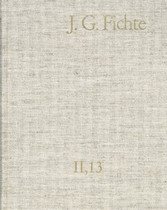Suchen und Finden
Service
Johann Gottlieb Fichte: Gesamtausgabe / Reihe II: Nachgelassene Schriften. Band 13: Nachgelassene Schriften 1812 - Gesamtausgabe der Bayerischen Akademie der Wissenschaften
Mehr zum Inhalt

Johann Gottlieb Fichte: Gesamtausgabe / Reihe II: Nachgelassene Schriften. Band 13: Nachgelassene Schriften 1812 - Gesamtausgabe der Bayerischen Akademie der Wissenschaften
Die >Wissenschaftslehre von 1812< - die letzte, die Fichte vollständig vorgetragen hat - wird der Forschung erstmals in zuverlässiger Form vorgelegt. In ihr deduziert Fichte vom höchsten bestimmten 'Blick' aus, dem des sittlichen Wollens als einem der höheren 'Schemata' der Erscheinung des Absoluten, die weiteren Momente des Wissens. Die >Rechtslehre< von 1812 wird ausschließlich nach der Handschrift wiedergegeben. Drei nicht exakt zu datierende Texte zeigen Fichtes Reaktion auf die Zeitereignisse (u.a. Napoleons Kontributionsforderungen an den preußischen Staat). Außerdem stellt der Philosoph grundsätzliche Überlegungen auch auf volkswirtschaftlichem Gebiet an (Bewertung landwirtschaftlicher Güter, Geldwerttheorie). The Wissenschaftslehre of 1812. This is the last complete version of Fichte's lectures on the Wissenschaftslehre, and it is here published for the first time in a reliable edition. This version begins with the most determinate 'point of view,' that of ethical willing, understood as one of the higher 'schemata' of the absolute's appearance, from which Fichte deduces the additional moments of knowing. The texts of the 1812 Doctrine of Right [Rechtslehre] and the 1812 Doctrine of Ethics [Sittenlehre] published here are based entirely on the lecture manuscripts and incorporate nothing from previously published texts based upon other sources. -- Three additional texts, none of which can be precisely dated, illustrate Fichte's reaction to events of the day, such as Napoleon's demand for reparations from Prussia. Here the philosopher engages in fundamental reflections concerning the economic realm (the valuation of agricultural wealth, monetary theory). The introductory lecture of the Summer Semester of 1812 documents Fichte's efforts, at the start of the semester, to attract and to introduce as many interested students as possible to the study of philosophy.
Alle Preise verstehen sich inklusive der gesetzlichen MwSt.






